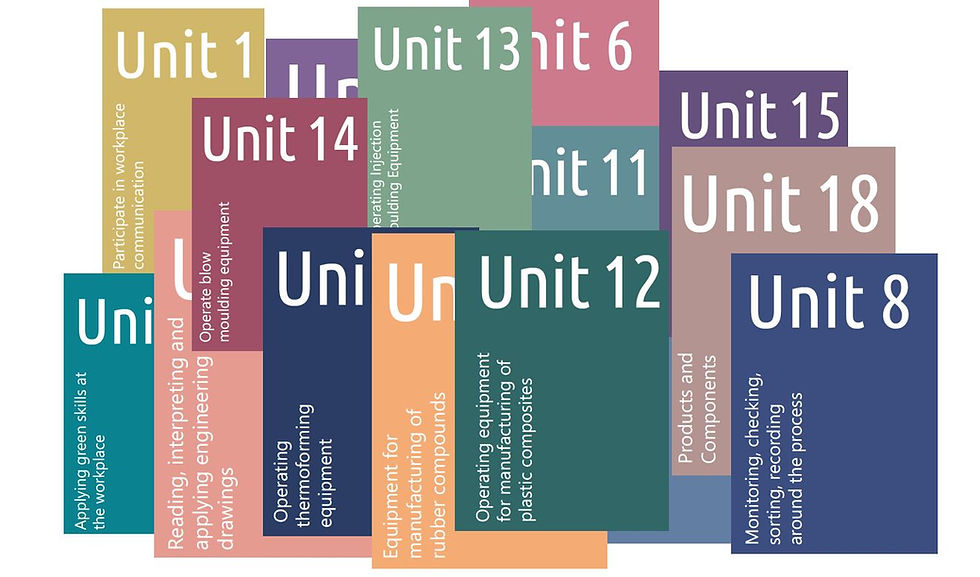6th meeting of the UPSKILL Project Steering Committee
- Federica Gallicchio

- Apr 13, 2021
- 4 min read

The partners of the UPSKILL Project met on 9 April during the last online meeting of the Steering Committee.
The slight sense of bitterness caused by the end of such fruitful cross-border cooperation was overshadowed by the feeling of satisfaction for the great results achieved throughout the development phase of this groundbreaking project that will represent a true digital revolution within the plastics sector.
“I am proud of all the work that has been done, particularly in consideration of the global crisis caused by the outbreak of the pandemic, which did not allow us to meet in person. Nonetheless, we had great resources at our disposal and we were able to keep the work going through continuous coope ration across the teams. We did a great job” said Marc Manguin, Upskill project leader from Polyvia-Formation.
During the meeting, all leaders of the different work packages provided thorough overviews of the goals achieved since the beginning of the project in 2019 and of the ongoing refinement work that will be finalised in the upcoming weeks.
Gražina Žardalevičienė, Upskill Project Coordinator from Linpra, led the discussions throughout the meeting.
The round of presentations was opened by Franck Steunou (Polyvia Formation), who provided a summary of the implementation of the project, underlying the great added value of the six-months extension granted towards the end of 2020, which allowed a better fine tuning of the training material according to the feedback received by teachers and students during the piloting phase.
The floor was subsequently taken by Lina Lukošiūnenė (KPMPC), leader of Work Package 1 on Qualification and Curricula Research. In this context, the national qualification of plastics machine operators, including VET curricula and competence profiles, were analysed and several recommendations were delivered for the design of model EQF based VET curriculum for plastics machine operators.
Marc Manguin (Polyvia Formation) presented the work carried out in Work Package 2 (Model VET Curriculum) and Work Package 3 (Students’ and Teachers’ Manuals). While the Curriculum was approved in 2019, the work on the books and the results of the piloting phase carried out through the entire development of the project constantly highlighted some essential modifications for the further improvement of the initial work. Both manuals have been finalised and are now available in English both in printed and digital version, while the translations in Lithuanian, French and Finnish is currently ongoing. This section of the meeting was closed by Sirkka Ilveskoski (TREDU), who analysed the outcome of the work from the teachers’ perspective, stressing the enrichment of the project stimulated by the need to create alignment among the different background of the educators in all countries, which has allowed the participants to learn from each other’s experiences.
The overview of the activities carried out within Work Package 5 on Quality Assurance and Evaluation was presented by Aurelie Bruder (Polyvia). The analysis run in this part of the project helped ensure that the results of the UPSKILL project would be relevant to the students and teachers and developed in compliance with the objectives initially delineated. The assessments have been run by an independent external evaluator, through both periodic analysis during the piloting phase and evaluations carried out for specific project outcomes by ad hoc experts.
Živilė Šatienė (APRC) presented an overview of the outcomes and conclusions of the piloting phases (WP4) which took place in February 2020 and September-December 2020. At the end of the testing phase, 182 participants (32 trainers and 150 students) have been granted qualification certificates proving the successful conclusion of the piloting work package. The added value of this phase was found in the mode that the training activities were carried out, which were focused both on the implementation of the theoretical knowledge of the participants and on the practical application of their newly acquired skills on plastics machine. The testing was run through both individual and group approaches, tailoring the exercises to the students’ background and to their familiarity with the new techniques.
Marjan Ranogajec (EuPC) project leader of Work Package 6 on Dissemination and Exploitation described the communication activities carried out throughout the entire project, which aimed at spreading UPSKILL’s development and outcome to the widest possible community through several channels. EuPC has been in charge of the work on all communication materials, from the website to the planning of the online events and the establishment of a media partnership with the Kunststoff Magazine, the renowned online information platform in the plastic sector.
The meeting was lastly closed with the description of the UPSKILL project management (WP 7) provided by Gražina Žardalevičienė (Linpra). Here the focus was mainly put on the administrative and financial aspects of the project and on the general overview of the last activities, such as technical reports, to be finalised by May 2021.
The UPSKILL project will now come to an end with the online event on 15 April 2021. The registrations are open at this link.
Join the public conference to find out more about the final UPSKILL’s achievements and spread the word! Participation is free of charge for all interested parties.




Comments